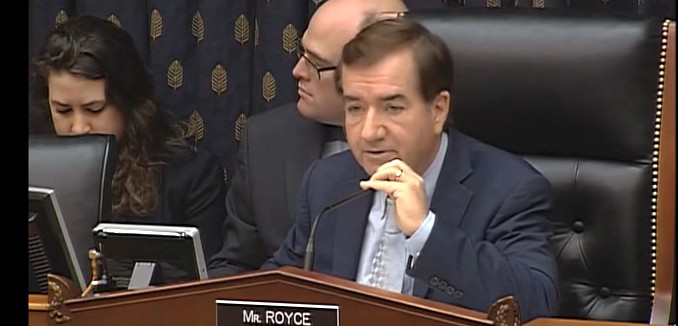A letter signed by 369 members of Congress calling on President Mahmoud Abbas to stop incitement to violence within the Palestinian Authority was released by the House Foreign Affairs Committee on Thursday.
The letter was signed by committee Chairman Ed Royce (R – Calif.) and ranking member Rep. Eliot Engel (D – N.Y.), as well as over 80% of the House membership.
We are writing to express our deep concern over the recent wave of Palestinian violence in Israel and the West Bank. Unless immediate action is taken to end incitement and bring the situation under control, this escalating violence – including stabbings, shootings and other terrorist acts — will undermine the prospects of a two-state solution.
There have been some efforts to curb the violence and protect the peace. But statements made by you, other political figures, clerics and official PA media have undoubtedly served to inflame the current situation. False claims about changing the status quo on the Temple Mount or accusations of Israel executing an attacker — when, in fact, he is being treated in an Israeli hospital — only encourage more acts of terror. The abhorrent and deadly rhetoric – including calls for knife attacks on Israelis – must stop.
Now is the time for the Palestinian Authority to take concrete steps to avoid further violence. This starts with a sustained effort to publicly and officially repudiate these attacks, ending the unacceptable incitement to violence emanating from Palestinian Authority officials and institutions, continuing important security cooperation with Israel and agreeing to unconditionally renew direct talks with the Israelis.
The stakes are high. Now is the time for responsible and sustained leadership on these critical issues.
The release of the letter follows the unanimous passage of a bipartisan resolution by Congress earlier this week decrying Palestinian incitement. Last month, the House Foreign Affairs Committee held a hearing on Palestinian calls to violence, which was followed by the unanimous passage of a resolution that condemned Abbas for, “praising the killers of Israelis as “heroes,” for labeling Jews a “contaminating” presence on the Temple Mount (Haram al-Sharif) and for encouraging bloodletting in Jerusalem,” according to The Jerusalem Post.
Also on Thursday, Palestinian Media Watch (PMW) reported that Al-Hayat Al-Jadida, the official daily of the PA, published a cartoon calling rocks a Palestinian’s “best friend ever.” Last month, PMW reported that a PA municipality named a street after Muhannad Halabi, the terrorist who killed 2 Israelis and wounded a mother and her toddler in Jerusalem on October 3rd.
In How the Mufti of Jerusalem Created the Permanent Problem of Palestinian Violence, which was published in the November 2015 issue of The Tower Magazine, Edy Cohen explained that the problem of Palestinian incitement goes back nearly a century to the Mufti of Jerusalem, Haj Amin al-Husseini.
Haj Amin al-Husseini, known as the Mufti of Jerusalem, has suddenly become the object of considerable public discussion. The recent controversy over Israeli Prime Minister Benjamin Netanyahu’s remarks—in which he claimed, erroneously, that the Mufti had persuaded Adolf Hitler to exterminate the Jews—has brought sudden attention to one of the most important figures in the history of the Arab-Israeli conflict.
That’s because al-Husseini was not only the founding father of the Arab national movement in Palestine. He was also a fervent anti-Semite, the most important Nazi collaborator in the Arab world, and a political activist who worked tirelessly for the ethnic cleansing and physical destruction of the Jews in Palestine and in the Middle East as a whole.
As Israelis face yet another wave of violence at the hands of Palestinians, and we ask yet again about its causes, a serious look at the Mufti’s role in crafting, justifying, and encouraging such violence becomes crucial for our understanding. For the Mufti not only founded Palestinian nationalism as we know it today, but defined it as an ideology of absolute rejectionism and even genocide. In effect, the Mufti denied that the Jews had any national rights whatsoever, and especially not in the historic Land of Israel.
In this, the Mufti originated the single most important obstacle to peace in the Middle East: The Palestinian refusal to accept Jewish sovereignty and even physical presence in any part of the Land of Israel. In many ways, to understand the Mufti is to understand why the Palestinians, despite numerous opportunities to do so, still refuse to make peace.
[Photo: HFACDemocrats / YouTube ]




